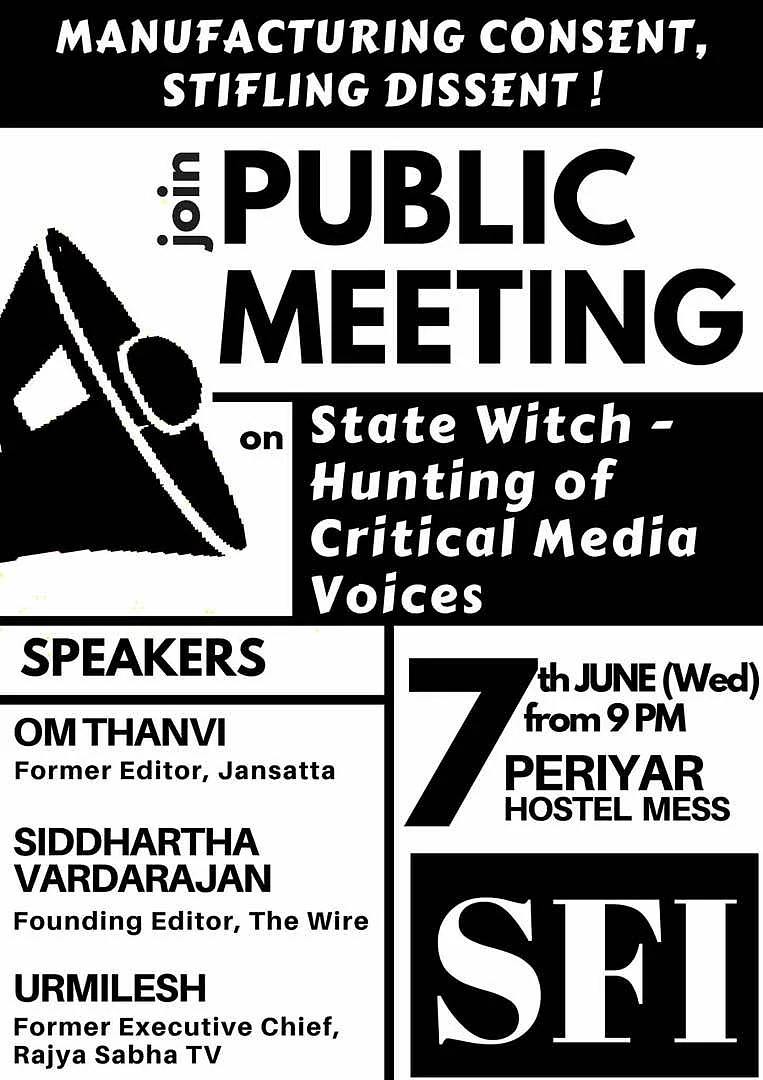Speaking out in the age of political correctness
Senior journalists are scheduled to speak at an event in JNU organised by SFI, the student wing of CPI(M)
Two days after raids by Central Bureau of Investigation (CBI) at the residence of NDTV Co-Founder Prannoy Roy elicited allegations of intimidation of the media, a public meeting on the topic “State Witch-Hunting of Critical Media Voices” is scheduled to take place at the Jawaharlal Nehru University (JNU) on Wednesday June 7.
The event is being organised by the Students’ Federation of India (SFI), the student wing of the Communist Party of India (Marxist), and journalists Siddharth Varadarajan, Urmilesh and Om Thanvi will be among the speakers.

Ratan Kumar, unit president of SFI at JNU, told Newslaundry that the purpose of the event is to highlight “indirect attempts by the government to control the media”. “On the one hand you have media houses like Zee News which ran doctored videos about JNU – no action has been taken against that,” Kumar said. “But anyone who is critical of the government, they are being attacked.”
However, at a time when the credibility of media houses is tarnished by their perceived proximity to political parties, questions can be raised on journalists attending an event organised by the student wing of a political party, be it SFI, Akhil Bharatiya Vidyarthi Parishad (ABVP), Rashtriya Swayamsevak Sangh’s (RSS) student wing, or the National Students Union of India (NSUI), which is affiliated to the Indian National Congress.
Should journalists, then, limit their appearances on platforms that are apolitical, so to speak, like the Editors Guild of India or the Press Council of India?
Urmilesh, former Executive Editor of Rajya Sabha TV, drew a distinction between political parties and student organisations. “As a journalist, I have never attended any seminar or symposium organised by any national or regional political party,” he told Newslaundry. “But as far as mass organisations are concerned, I don’t think there is any big issue or problem for any journalist or author to attend because mass organisations do not always represent the party.” Student organisations, he felt, fall into the category of mass organisations. “They might be associated with any political party but they are also representing the student community,” he said.
Thanvi, former editor of Jansatta, said that at a time when the media is under attack, journalists should speak out in protest regardless of the forum. “When there is an attempt to take away our right to speak freely, then journalists should utilise any platform they get to speak out against it,” he stated. “If such an event was organised by RSS or BJP’s (Bharatiya Janata Party) wing, even then I would’ve attended it,” Thanvi added.
Saying that “it is important to reach out to students”, Varadarajan, founder editor of The Wire, echoed Thanvi’s views. “If they [ABVP] give me freedom to speak and say what I want to say, then I have no issues [attending an event]. Everything depends on how the question is framed and what the agenda of the meeting is.”
“So far, of course, my experience with ABVP has not been encouraging,” Varadarajan added. “They forced the VC of Allahabad University to withdraw an invitation for me to speak in the senate hall last year, and then held me hostage in his office when I met him to protest about this. The irony is that I was to deliver a public lecture on the freedom of speech!”
Advocating the need to present a united stand against threats to press freedom, Thanvi felt that keeping up the appearance of political neutrality shouldn’t deter journalists from speaking out. “We don’t care about the politics of the students who are organising the programme. Our politics is that if there is a danger to press freedom, journalists will have to speak.” He also said that journalists should be willing to engage with audiences whose views don’t necessarily conform to their own. “Our world shouldn’t become so narrow that we say ‘We’ll only go to places where people agree with us’. Instead, we should certainly go where people’s views differ from ours.”
Newslaundry asked R Jagannathan, editorial director of Swarajya, what he made of journalists attending event organised by student organisations. “It’s a free country so anybody can go and address anywhere,” he said. “Somebody calls you so you can obviously attend. You may attend them as an outsider who is giving his own views or because you sympathise with them. Only thing is that you shouldn’t pretend that you’re highly neutral in other things.”
Given that a large section of the media today parrots the government’s line while dissenters are targeted, opposition to the government has taken precedence over non-partisanship.
The author can be contacted on Twitter @Kshitijmalhotra
